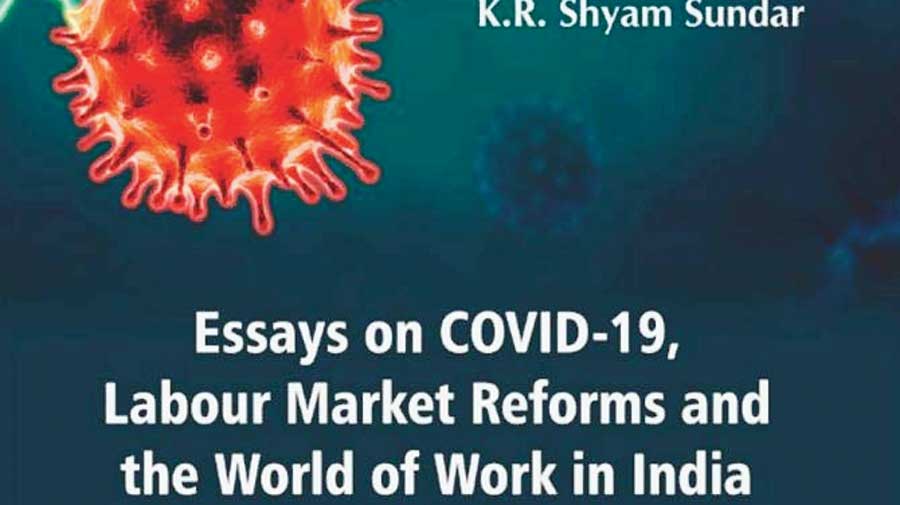A new book by K.R. Shyam Sunder, labour economist and professor of human resources management at XLRI, Jamshedpur, which attempts to provide a critical and comprehensive analysis of policies, laws and rights concerning workers during the pandemic, was released virtually at the institute on Thursday.
The book, Impact of Covid-19, Reforms, Poor Governance on Labour Rights in India, also discusses the responses and strategies followed by the trade unions during the most challenging period witnessed in the history of humanity. The book published by Synergy Books India not only critically analyses the contemporary developments but also provides valuable recommendations based on the people-centric approach of the International Labour Organisation (ILO).
“The Covid-19 pandemic has wrought the worst possible havoc both on lives and livelihoods of people in all the countries. However, the adverse impact has landed far more severely on the vulnerably placed informal and unorganised workers, people below the poverty line and thereby exacerbating existing inequalities in the economic system. The ILO strongly
recommended a four-pillar approach which is a comprehensive and balanced approach arguing for designing policies and measures based on social dialogue to ensure employment generation, income and social protection and workers’ rights. But the tale of policy-making in India during the pandemic does not conform much to the healthy perspective of the ILO,” said Shyam Sunder during the book release.
“My book is based on the fundamental premise that labour institutions and social dialogue are indispensable for promoting a sound labour market and industrial relation policies that would at once protect both employers’ and workers’ rights and concerns, especially during the crisis-ridden crucial time such as the one we are facing now,” he added. He has so far published over 75 articles and book reviews in research outlets and authored 12 books and edited five in the field of industrial relations and labour economics.
He further said: “Had the government consulted the social partners in not only designing a comprehensive policy architecture to provide relief and life-saving measures especially to the small enterprises and informal workers but also in their delivery, had the government and other agencies implemented even a fraction of the even conceptually defective labour laws concerning the unorganised and migrant workers, had the government consulted global organisations like the ILO, the UN and academics in tackling the workers’ woes, the play of pandemic in the lives of these millions of distraught workers would have been better.”
He said the whole tragic story of workers’ rights is the shoddy or non-implementation of even the meagrely legislated rights. A comprehensive database of work and employment is essential for devising universal social protection which would help better implementation of the four new labour codes, he added.
“Around 68.4 per cent of workers in the non-agricultural sector work in the informal sector, about 70 per cent lack written contracts and more than half of them don’t have paid leave or any social security (according to the Periodic Labour Force Survey 2018-19). Given the extreme precarity of workforce in the non-agricultural sector which is unlikely to have reduced (in fact uncertainty would have been intensified thanks to Covid-19), the resurgence of Covid poses serious and grave concerns for the workers in particular and the society and economy in general,” the author said.
The book was released by D. Narasimha Reddy, retired professor of economics, University of Hyderabad in the presence of Babu Mathew, professor, National Law School of India University, Praveen Jha, professor, Centre for Economic Studies and Planning, School of Social Sciences, JNU, New Delhi, Ramapriya Gopalakrishnan ILO consultant and leading labour advocate, Chennai, and Radhika Kapoor, senior fellow, Indian Council for Research on International Economic Relations.
XLRI campus closed
Forty-six students of XLRI have tested positive for Covid-19. The students have been isolated and quarantined within the campus and have been kept under observation by the in-house doctor.
“XLRI has been strictly adhering to all the Covid-19 directives and guidelines of the state government and complying with all the necessary precautionary steps and protective measures. To contain the infection, contact tracing has been initiated, and all contact staff members and students will undergo a mandatory RT-PCR test. All the campus facilities, including the library, the computer lab, will remain closed until further notice,” said a communiqué issued by the B-school on Saturday.
The XLRI administration has undertaken all required precautionary measures and all hostels and offices are being sanitised to contain the spread of infection. However, online classes will continue without any disruption.











